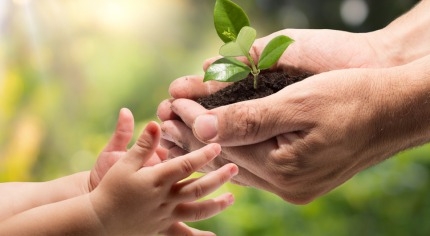Dear Friends,
I felt it was fitting this week to speak about endings, considering we have come to the end of the book of Genesis. At the sunset of one’s life it’s natural to think about what we have been able to accomplish, what we regret, and what our friends and family will likely gain from us. We have optimism that our legacies will live on. Some of us accomplish this by leaving money to causes that moved us, while others pass on their knowledge and ideas through writing books or starting foundations. In this week’s parsha, Va-y’chi, we encounter the passing of Jacob and how he wishes his legacy to be.
Jacob knows his time is limited so he calls upon Joseph to bring Manasseh and Ephraim before him. Jacob blesses his grandchildren, placing his right hand on the head of Ephraim and the left on Manasseh’s head. Joseph notices that his father is blessing the younger with his right hand and the older with his left and tries to move his father’s hands. Jacob, however, indicates that he knows what he is doing by putting Ephraim before Manasseh. Jacob proceeds to call his twelve sons to gather around him. Each son is given an evaluation of their life and a prediction of the future from their father. Some are praised for living Jacob’s values while others are critiqued for failing to embody them. For example, he noted Judah’s leadership among his brothers. Some of the sons received blessings of hope that their lives would be better than their father’s. As he finishes his blessings and critiques, he reminds his sons one final time that he wishes to be buried with Abraham and Isaac. He then passes on.
In a commentary on On1Foot.org (part of American Jewish World Service), Shira Fischer remarks on Jacob’s legacy and its impact on the Jewish people:
He wanted his children not only to know his values, but also to live them out in the world, to carry on the ethical trajectory of his life. Perhaps this is reflected in Jacob’s parting utterance: more command than wish, he instructed all his sons that he desired to be buried not in Egypt, but with his ancestors—“Where Abraham was buried, and Sarah his wife, where Isaac was buried, and Rebecca his wife, and where I buried Leah.” By asking his sons not to leave him in Egypt, he was forcing them to take action, to stay connected to their ancestors, and ultimately, to leave Egypt and return to the land of Israel. The rest of the Torah can be viewed as the story of the Children of Israel attempting to fulfill Jacob’s—Israel’s—legacy.
I now pose the question, what are we doing to not only to fulfill Jacob’s legacy, but to create our own that our children and their children will continue on? I have mentioned in numerous Shabbat Shalom messages that I am constantly in awe of the great work our congregation does in repairing the world. Just look at this past week and see the amazing work that our Social Justice Committee did hosting families from Family Promise as well providing lunches for those in need in Chicago. The work of these dedicated people, our members, makes me hopeful that we can make the world a better place. It’s up to us to continue to live by the values of Jacob. It’s up to us to teach our children and the community to live by those values. It’s not too late to change our legacies either. Taking part in one of the many projects temple is involved with is easy to do. Fischer adds, “legacy is as much about looking forward as it is about looking back.”
As this is the end of the book of Genesis, it is important to look forward to the next part of the journey. This book ends with a bit of foreshadowing. The last word is “Egypt” which hints to the book of Exodus and the nation of Israel’s time in the land of Egypt. Similarly, the last words of the other four books of the Torah hint at the contents of the next book with the last word of the Torah being “Israel.” Israel, the light among the other nations, is a perfect example of legacy. Its history, both biblical and modern, stresses the importance of fulfilling the values of Jacob. We should all strive to perform as many mitzvot and make as much change as possible with our time here on Earth.

